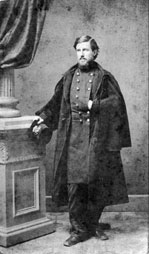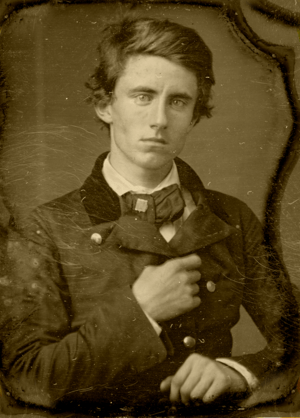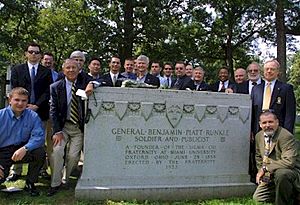Benjamin Piatt Runkle facts for kids
Quick facts for kids
Benjamin Piatt Runkle
|
|
|---|---|

Benjamin Piatt Runkle
|
|
| Born | September 3, 1836 West Liberty, Ohio, US |
| Died | June 28, 1916 (aged 79) Hillsboro, Ohio, US |
| Place of burial | |
| Allegiance | Union |
| Service/ |
United States Army Union Army |
| Years of service | 1861–70 |
| Rank | |
| Unit | 13th Ohio Infantry |
| Commands held | 45th Ohio Infantry Cavalry Brigade, Gilmore's Division, Department of the Ohio 3rd Brigade, 4th Division, XXIII Corps |
| Battles/wars | American Civil War
|
| Relations | General Abram S. Piatt (Uncle) |
| Other work | Freedmen's Bureau Episcopal priest Miami University trustee |
Benjamin Piatt Runkle (September 3, 1836 – June 28, 1916) was an important figure in American history. He was one of the seven young men who founded the Sigma Chi fraternity. During the American Civil War, he was a brave officer in the Union Army. After the war, he helped lead the Freedmen's Bureau in Kentucky, which assisted formerly enslaved people. Runkle was also involved in a famous case heard by the Supreme Court called Runkle v. United States. Later in life, he became an Episcopal priest and served as a trustee for Miami University twice.
Contents
Early Life and College Days
Benjamin Runkle was born in West Liberty, Ohio. He went to Geneva College and then to Miami University, graduating in 1857. It was at Miami University that he became one of the founders of the Sigma Chi fraternity.
Runkle was known for being strong-willed. In a key meeting about the fraternity, he famously threw his old fraternity badge on a table and declared, "I didn't join this fraternity to be any one's tool. And that, sir, is my answer!" He even got suspended from school once for fighting in chapel.
In 1857, Runkle married Venitia Reynolds, and they had a daughter named Maud. After college, he studied law and became a lawyer in 1859. He also ran for the Ohio State Senate. When the Civil War began, Runkle joined an Ohio militia group, which later became part of the 13th Ohio Infantry.

Serving in the Civil War
Joining the 13th Ohio Infantry
Benjamin Runkle became a captain in the 13th Ohio Infantry in April 1861. He was promoted to major after the Battle of Carnifex Ferry in November 1861. In April 1862, his regiment marched quickly to join General Don Carlos Buell's forces. They then continued to the Battle of Shiloh.
At Shiloh, Runkle's regiment bravely led an attack that captured an enemy artillery battery. During a counter-attack, he was shot in the feet and then again in the right jaw. His injuries were so severe that many thought he would not survive. A newspaper reporter even wrote an obituary saying he "died a hero." But Runkle recovered and lived many more years! He was promoted to lieutenant colonel in May 1862.
Leading the 45th Ohio Infantry
After healing from his wounds, Runkle was made a Colonel of the 45th Ohio Infantry in August 1862. His regiment was sent to Cynthiana, Kentucky. They later had to retreat to Covington, Kentucky, where they helped defend Cincinnati from Confederate forces.
In early 1863, Runkle's regiment became a mounted unit (meaning they rode horses). He commanded a brigade of cavalry. His men bravely broke through enemy lines at the Battle of Dutton's Hill in March 1863. The commanding general praised Runkle for his courage and gave his unit full credit for the victory. They also fought in the Battle at Monticello, Kentucky, driving back Confederate forces.
Other Important Commands
From July 1863 to January 1864, while still recovering, Runkle worked for Ohio's governor. He also led Ohio Militia units to stop Morgan's Raid. Later, he commanded a brigade in the XXIII Corps in Kentucky and Tennessee. He took part in Sherman's Atlanta Campaign, fighting in battles like Rocky Face Ridge and Resaca. Runkle left active duty in July 1864 but continued to serve in the Veteran Reserve Corps until the war ended.
Helping Freed People
After the war, Benjamin Runkle worked for the Freedmen's Bureau. This organization helped formerly enslaved people adjust to freedom. He served as the Chief Superintendent of the Freedmen's Bureau for Memphis, Tennessee.
In 1866, President Andrew Johnson nominated Runkle to be a brevet brigadier general. This was an honorary rank given for his service. The United States Senate approved this appointment.
Runkle was in Memphis during the Memphis riots of 1866. He had very few troops, so he couldn't protect the black Union veterans who had just left the army. In 1869, Runkle became the head Superintendent of Freedmen's Affairs for Kentucky. He oversaw the closing of schools and the distribution of remaining funds as the Bureau's work in Kentucky ended in 1870.
A Legal Challenge: Runkle v. United States
While working for the Freedmen's Bureau, Runkle faced some legal trouble. There were questions about how money was handled by people working under him. He was tried by a military court, which found him guilty of some charges. His sentence included dismissal from the army.
However, the law at the time said that an officer's dismissal in peacetime needed to be confirmed by the President. It wasn't clear if President Ulysses S. Grant had personally confirmed Runkle's dismissal. Runkle argued this point. When President Rutherford B. Hayes took office, he reviewed the case. On the advice of his legal team, President Hayes decided that Runkle's dismissal was not properly confirmed. He reversed the earlier decision, meaning Runkle was never legally dismissed from the army.
This led to the Supreme Court case, Runkle v. United States. The government tried to argue that President Hayes didn't have the right to reverse the dismissal. But the Supreme Court sided with Runkle! They ruled that he was never legally dismissed from the army. This meant he was entitled to all his military pay, including back pay and extra pay for his years of service.
Later Life and Legacy
Benjamin Runkle retired from military service in 1870 as a major and honorary colonel. From 1879 to 1885, he studied to become an Episcopal priest and served in churches in several states. In 1894, he married his second wife, Lalla McMicken.
Runkle was the only founder of Sigma Chi fraternity to become its Grand Consul (national president), serving from 1895 to 1897. He also held leadership roles at several military schools. He served as a trustee for Miami University for many years, from 1863 to 1872 and again from 1912 until his death.
Benjamin Piatt Runkle passed away at his home in Hillsboro, Ohio, on June 28, 1916. This was also the sixty-first birthday of the Sigma Chi fraternity he helped create. He is buried at Arlington National Cemetery in Virginia, a place of honor for many American heroes.
 | Jessica Watkins |
 | Robert Henry Lawrence Jr. |
 | Mae Jemison |
 | Sian Proctor |
 | Guion Bluford |


